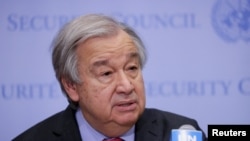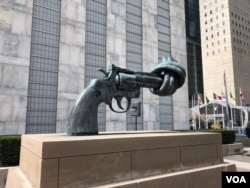Editor's note: Here is a fast take on what the international community has been up to this past week, as seen from the United Nations perch.
U.N. Secretary-General will travel to Moscow to meet Putin, Lavrov
U.N. Secretary-General Antonio Guterres will meet Russian President Vladimir Putin in Moscow on Tuesday and hold meetings and a working lunch with Foreign Minister Sergey Lavrov, the U.N. said Friday.
The U.N. chief had written to Putin on Tuesday requesting a meeting to discuss the next steps toward peace in Ukraine. He also wrote to Ukrainian President Volodymyr Zelenskyy. Guterres' representative said his office is in contact with the government in Kyiv about scheduling a visit there as well.
No Easter humanitarian pause for Ukraine
The secretary-general appealed Tuesday for a four-day humanitarian pause to coincide with Orthodox Easter, which is celebrated in both Ukraine and Russia on April 24. The temporary truce, which Guterres suggested go into effect Thursday, has so far failed to materialize.
‘A horror story of violations’ against Ukraine’s civilians
U.N. High Commissioner for Human Rights Michelle Bachelet said Friday that her office has detailed “a horror story of violations perpetrated against civilians” in Ukraine. She said Russia’s indiscriminate shelling and bombing of populated areas, the killing of civilians and destruction of hospitals, schools and other civilian infrastructure may amount to war crimes.
U.N.’s five veto holders may face scrutiny
Since the U.N. was created in 1945, the five permanent members of the U.N. Security Council – Britain, China, France, USSR/Russia and the United States – have used their veto about 295 times to block measures they did not see as in their national interest. The former Soviet Union, then succeeded by the Russian Federation, has done so most often. Now the war in Ukraine has put the veto dynamic in the spotlight and demonstrated how it can tie the Security Council’s hands for action in doing its job – namely maintaining international peace and security. On Tuesday, the General Assembly is scheduled to vote on a resolution that would ask a permanent member who casts a veto to come explain to the full membership why they did it. The measure is likely to receive strong support.
Yemen’s Houthi rebels agree to stop recruiting child soldiers
The United Nations said Monday that Yemen’s Houthi rebels have signed an action plan to prevent and end recruiting or using children in armed conflict, killing or maiming children, and attacking schools and hospitals. More than 10,200 children have been killed or injured since the war started in 2015. It is unclear how many have been combatants.
20 million could face severe hunger from drought in Horn of Africa
The World Food Program warned Tuesday that as many as 20 million people in drought-affected parts of Ethiopia, Kenya and Somalia could face catastrophic levels of hunger if the current rainy season fails for a fourth consecutive year.
In brief
— The United Nations said Wednesday that more than 5 million people have fled Russia’s war in Ukraine for safety elsewhere. The refugee crisis is the fastest and largest since World War II. Another 7.1 million are internally displaced.
— Secretary-General Guterres expressed concern Wednesday about the deteriorating security situation in Jerusalem and called for provocations to stop immediately, particularly around the holy sites. Fighting has intensified in recent weeks between Israelis and Palestinians as Christians, Jews and Muslims all observe holy days simultaneously. Palestinians have accused Israeli police of using excessive force against them at holy sites, while Israeli police say the Palestinians have initiated the violence.
Quote of note
“What we are witnessing now is a major disruption to harvest, planting and supply chains for essential foods and materials. What we are witnessing now is the direct and indirect acceleration of hunger for tens of millions of people. Collateral damage of an unwarranted, unwanted war.”
Ireland’s U.N. Ambassador Geraldine Byrne Nason on the global impact of Russia’s war on Ukraine during a U.N. Security Council informal meeting Thursday on the link between conflict and hunger. The United Nations says 139 million people worldwide already experience conflict-induced hunger and warns that 47 million more may go hungry this year as a result of the impact of Russia’s invasion on rising food, fertilizer and fuel prices and availability.
Some good news
More than 1 million children in Ghana, Kenya and Malawi have now received one or more doses of the world’s first malaria vaccine through a pilot program coordinated by the World Health Organization. The WHO says the malaria vaccine pilots have shown that the RTS,S/AS01 vaccine is safe and practical to deliver, and that it substantially reduces deadly severe malaria. If the vaccine is widely administered, WHO says it could save the lives of an additional 40,000 to 80,000 African children each year.
What we are watching next week
On April 27, Ukraine’s foreign minister will address an informal meeting of the U.N. Security Council on accountability for crimes committed during Russia’s war in his country. The Arria format meeting will hear remarks by the High Commissioner for Human Rights Michelle Bachelet, International Criminal Court Prosecutor Karim Khan and Ukraine’s Prosecutor General Iryna Venediktova, among others.
Did you know?
The Knotted Gun sculpture, where Secretary-General Antonio Guterres made his appeal this week for an Easter truce in Ukraine, was created by Swedish sculptor Carl Fredrik Reuterswärd. The bronze statue depicts an oversized .357 Magnum revolver with its muzzle tied in a knot. The original sculpture was also known as “Non-violence” and Reuterswärd created it in tribute to Beatle John Lennon after he was gunned down outside his New York City apartment building in December 1980. The original statute was installed at the U.N. in 1988, and since then 30 replicas have been displayed in various places around the world, according to the Non-Violence Foundation’s website. You can see it on the plaza inside the U.N. compound near the visitor entrance.










